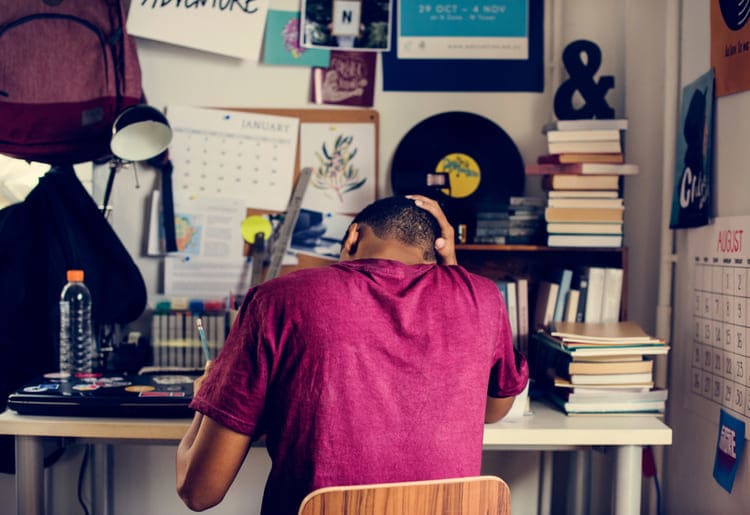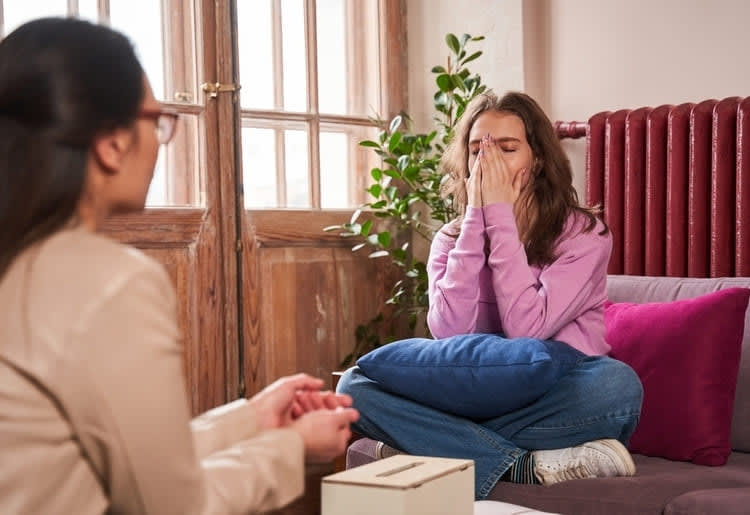Teenage years are filled with everyday stressors, from school demands to transitioning through milestone moments like making friends and dating. Stress is our body's natural response to these anxieties and can sometimes be helpful, propelling us through high-pressure situations. But there are instances where it masks a more serious disorder.
I've encountered this frequently in my years of telehealth and online therapy. Let me help you identify the signs and symptoms of anxiety in teens and offer some tools and techniques for managing stress, seeking help, and guiding your child through their anxiety.
» Looking for support that fits your budget? Find an online therapy service that takes insurance.
Understanding Teen Anxiety
Anxiety is a normal human emotion, but it becomes concerning when it's overwhelming or starts impacting your life. It manifests as uneasiness, worry, and fear. Anxiety disorders include:
- Generalized anxiety disorder
- Social anxiety disorder
- Panic disorder
- Phobias
These conditions involve persistent, overwhelming anxiety that interferes with daily life. And teens are susceptible. In fact, about 31.9% of US adolescents aged 13 to 18 have experienced an anxiety disorder at some point in their lives.

Common Teen Anxiety Triggers
Teen anxiety can stem from various sources. Academic stress is a potent catalyst. In my professional experience, pressure to excel, manage homework, prepare for exams, and meet expectations often leads to anxiety, especially during high school when demands intensify.
Social and peer pressure also play significant roles. There's the struggle to fit in, form connections, and navigate the complexities of teenage friendships that can heighten anxiety. And the fear of judgment or exclusion, coupled with the desire for social acceptance, can be particularly challenging.
Family issues, including conflicts, divorce, or financial difficulties, can create a tumultuous home environment that fosters anxiety. Additionally, a lack of emotional stability and support at home can be distressing for teens.
Anxiety may also arise from concerns related to extracurricular activities, relationships, or transitional periods. From my perspective, the expectations tied to managing a packed schedule, maintaining relationships, and coping with life transitions like moving or starting high school can exacerbate anxiety.
» Dive into our comprehensive online therapy cost breakdown.

Signs and Symptoms of Anxiety in Teens
Spotting anxiety in teens means keeping an eye out for various signs. As someone who works with this every day, I suggest looking out for:
- Physical symptoms like stomach aches, headaches, muscle tension, and fatigue
- Anxious or obsessive thoughts
- Changes in sleep patterns
- Declining academic performance
- Social withdrawal and isolation
- Perfectionist behaviors
- Constant reassurance seeking
- Alterations in eating habits
- Obsessive or compulsive behaviors
These signs can give us a window into what a teenager may be going through. Most people with anxiety experience excessive worry about everyday things, often without a clear reason. They may also avoid situations that make them anxious. So, if you notice these symptoms, it may be time to seek professional help.
»Overthinking causing anxiety? Learn how to deal with overthinking and reduce stress

Managing Teen Anxiety
Anxiety isn't typically "cured" in the traditional sense. Instead, it's effectively managed. With the right interventions, coping strategies, and support systems, you can greatly reduce or almost eliminate the symptoms.
As a parent, you play a vital role in helping your teenager's journey through anxiety. You need to foster a warm and empathetic attitude towards your child's mental health. Validating their concerns also builds trust and ensures they feel heard.
Open and honest communication is key, too. Strive to create an environment where your teenager feels safe sharing their thoughts and emotions without fear of judgment. By actively listening and taking their problems seriously, you show your investment in their well-being.
A critical aspect of support is the willingness to seek professional help when required. If your teenager's anxiety becomes unmanageable, be open to therapy or counseling. This shows your commitment to their mental health and understanding that some issues may require specialized assistance.
You can also:
- Support your teen by explaining that treatment is available
- Model healthy coping strategies, such as deep breathing
- Promote self-care and relaxation
- Set boundaries on screen time
- Encourage exercise and a healthy diet
- Maintain open communication to create a supportive environment
» Check out our top picks for the best online therapy services for teens.

The Impact of Professional Support on Teen Anxiety
If your teen has anxiety, therapy can positively influence their life. One case I came across was with a 16-year-old student who experienced severe anxiety. This manifested in struggles socially and at school, affecting her academic performance.
With the help of a counselor and cognitive-behavioral therapy (CBT), she learned to identify her anxiety triggers, challenge unhelpful beliefs, and use relaxation techniques. Despite occasional moments of anxiety, the student improved significantly. She became active in class discussions, formed new friendships, and joined a school club.
There's an increasing need for therapy in teen communities, but only half of US schools offer assessments or treatment. That's where online therapy comes in: It can provide teens with the support and tools they need to manage anxiety, overcome challenges, and lead a happier, more fulfilling life.

